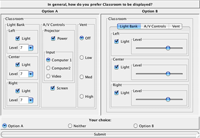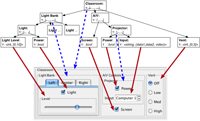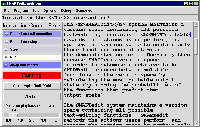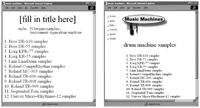
Personalizable User Interfaces |
|
 CSE Home CSE Home |
 AI Home AI Home |
 About CSE About CSE |
 Search Search |
 Contact Info Contact Info |
|
Last updated: April 17, 2005 OverviewTodays computer interfaces are one-size-fits-all. Users with little programming experience have very limited opportunities to customize an interface to their task and work habits. Furthermore, the overhead induced by generic interfaces will be proportionately greater on small form-factor PDAs, embedded applications and wearable devices. Automatic personalization may greatly enhance user productivity, but it requires advances in customization (explicit, user-initiated change) and adaptation (interface-initiated change in response to routine user behavior). In order to improve customization, we must make it easier for users to direct these changes. In order to improve adaptation, we must better predict user behavior and navigate the inherent tension between the dynamism of automatic adaptation and the stability required in order for the user to predict the computers behavior and maintain control. This page brings together projects spanning multiple areas that together aim to realize the vision of user- and device-specific user internfaces. Projects (Current)ARNAULD: Preference Elicitation For Interface Optimization Recent years have revealed a trend towards
increasing use of optimization as a method for automatically designing
aspects of an interface's interaction with the user. In most cases,
this optimization may be thought of as decision-theoretic --
the objective is to minimize the expected cost of a user's
interactions or (equivalently) to maximize the user's expected
utility. While decision-theoretic optimization provides a powerful,
flexible, and principled approach for these systems, the quality of
the resulting solution is completely dependent on the accuracy of the
underlying utility or cost function. Unfortunately, determining the
correct utility function is a complex, time-consuming, and error-prone
task. While domainspecific learning techniques have been used
occasionally, most practitioners parameterize the utility function and
then engage in a laborious and unreliable process of hand-tuning. more >>
Recent years have revealed a trend towards
increasing use of optimization as a method for automatically designing
aspects of an interface's interaction with the user. In most cases,
this optimization may be thought of as decision-theoretic --
the objective is to minimize the expected cost of a user's
interactions or (equivalently) to maximize the user's expected
utility. While decision-theoretic optimization provides a powerful,
flexible, and principled approach for these systems, the quality of
the resulting solution is completely dependent on the accuracy of the
underlying utility or cost function. Unfortunately, determining the
correct utility function is a complex, time-consuming, and error-prone
task. While domainspecific learning techniques have been used
occasionally, most practitioners parameterize the utility function and
then engage in a laborious and unreliable process of hand-tuning. more >>
SUPPLE: Automatically Generating Adaptive User Interfaces SUPPLE is an application and device-independent system, currently
under development at University of Washington, that automatically
generates user interfaces for a wide variety of display devices.
SUPPLE uses decision-theoretic optimization to render an interface
from an abstract functional specification and an interchangeable
device model. SUPPLE can use information from the user
model to automatically adapt user interfaces to different tasks
and work styles while also prividing extensive customization
mechanisms that allow for modifications to the appearance,
organization and navigational structure of the user interface.
more >>
SUPPLE is an application and device-independent system, currently
under development at University of Washington, that automatically
generates user interfaces for a wide variety of display devices.
SUPPLE uses decision-theoretic optimization to render an interface
from an abstract functional specification and an interchangeable
device model. SUPPLE can use information from the user
model to automatically adapt user interfaces to different tasks
and work styles while also prividing extensive customization
mechanisms that allow for modifications to the appearance,
organization and navigational structure of the user interface.
more >>
Projects (Past)Proteus: Personalizing Web Sites For Mobile Users Most web sites today are designed with a "one-size-fits-all"
philosophy. The web site designer "specs out" the needs of the web
visitor, and then creates the content accordingly. However, one size
frequently does not fit all. Visitors may use the site in ways
unanticipated by the site designer. For example, a site that contains
a broad array of information, such as a software support site, may be
structured with as deep hierarchcy according to product, version,
operating system, and error condition. However, visitors may follow
only a few paths through this site, and the deep hierarchy is
needlessly burdensome. In addition, a visitor's web client may be
constrained in same way, perhaps by a small screen size or slow
network connection. Content designed for large, color displays and
fast networks is seldom useful for such constrained devices.
more >>
Most web sites today are designed with a "one-size-fits-all"
philosophy. The web site designer "specs out" the needs of the web
visitor, and then creates the content accordingly. However, one size
frequently does not fit all. Visitors may use the site in ways
unanticipated by the site designer. For example, a site that contains
a broad array of information, such as a software support site, may be
structured with as deep hierarchcy according to product, version,
operating system, and error condition. However, visitors may follow
only a few paths through this site, and the deep hierarchy is
needlessly burdensome. In addition, a visitor's web client may be
constrained in same way, perhaps by a small screen size or slow
network connection. Content designed for large, color displays and
fast networks is seldom useful for such constrained devices.
more >>
DIAManD: Adaptive Interfaces for Machine Learning
Our previous work on the SMARTedit text-editing system led us to the same conclusion: machine learning tasks can benefit from careful management of interactions with the user. The result is a system that requires fewer examples to learn a concept, acquires domain knowledge more effectively, and is more appropriate for users unfamiliar with machine learning. Our current work involves studying how to implement and manage novel interactions in intelligent interfaces. Although the work began with the SMARTedit system, we are currently investigating other machine learning domains which could benefit from enhanced interfaces. Our first adaptive interface for machine learning called DIAManD sits atop the SMARTedit text-editing system. The interface exposes a small set of different interactions to the user and provides recommendations on which interaction to activate. DIAManD automatically initiates the best interaction if its confidence in that interaction is high enough. Thus, the system becomes an active participant in the discourse with the user. The user can still exercise full control (overriding the system's choice), but many users in our preliminary testing are delighted to receive feedback from the system and loath to ignore its advice. more >> SMARTedit: Programming By Demonstration Using Version Space Algebra
Computer applications are difficult to customize for the non-programmer faced with repetitive tasks. Macro recording systems allow users to record sequences of actions and play them back, but many users don't use them. Often the time and effort required to construct and debug macros that work correctly in all cases exceeds the time and effort required to do the repetitive task by hand. Macro systems are a form of programming by demonstration (PBD), in which users demonstrate their task to the system, which then learns a program that accomplishes the task. The benefits of PBD are that the user doesn't need to learn an arcane programming language in order to automate repetitive tasks, and she demonstrates her programs using an interface with she is already familiar. This research aims to address the drawbacks of existing macro recorder systems by combining a simple macro recording interface with AI machine learning techniques. Our goal is to apply algorithms from AI to construct a robust, domain-independent programming by demonstration system. more >> Adaptive Web Sites Todays Web sites are intricate but not intelligent; while Web
navigation is dynamic and idiosyncratic, all too often Web sites are
fossils cast in HTML. In response, this project investigates adaptive
Web sites: sites that automatically improve their organization and
presentation by learning from visitor access patterns. Adaptive Web
sites mine the data buried in Web server logs to produce more easily
navigable Web sites.
more >>
Todays Web sites are intricate but not intelligent; while Web
navigation is dynamic and idiosyncratic, all too often Web sites are
fossils cast in HTML. In response, this project investigates adaptive
Web sites: sites that automatically improve their organization and
presentation by learning from visitor access patterns. Adaptive Web
sites mine the data buried in Web server logs to produce more easily
navigable Web sites.
more >>
Publications
Krzysztof Gajos and Daniel S. Weld. Preference Elicitation
for Interface Optimization. In Proceedings of UIST'05, Seattle,
WA, USA, 2005.
Krzysztof Gajos, David Christianson, Raphael Hoffmann, Tal Shaked, Kiera
Henning, Jing Jing Long, and Daniel S. Weld.
Fast And Robust Interface Generation for
Ubiquitous Applications.
In Proceedings of the Seventh International Conference on Ubiquitous Computing (UBICOMP'05). Tokyo, Japan, September, 2005.
Krzysztof Gajos, Anthony Wu and Daniel S. Weld. Cross-Device Consistency in Automatically Generated User Interfaces. In Workshop on Multi-User and Ubiquitous User Interfaces (MU3I'05). San Diego, CA,
2005
Krzysztof Gajos, Raphael Hoffmann and Daniel S. Weld. Improving
User Interface Personalization. In UIST'04. Santa Fe, New Mexico,
2004
Krzysztof Gajos and Daniel S. Weld. Automatically Generating User Interfaces For Ubiquitous Applications. In Workshop on Ubiquitous Display Environments, Nottingham, UK, 2004.
Krzysztof Gajos and Daniel S. Weld.
SUPPLE: Automatically Generating User Interfaces. In Proceedings of
IUI'04. Funchal, Portugal, 2004
Tessa Lau, Pedro Dominogs, and Dan Weld, Learning Programs from Traces using
Version Space Algebra, K-CAP 2003, Sanibel Island, FL, October
2003.
D. Weld, C. Anderson, P. Domingos, O. Etzioni, T. Lau, K. Gajos, and
S. Wolfman. Automatically
Personalizing User Interfaces In Proceedings of
IJCAI-03. 2003.
Pedro Domingos, Yeuhi Abe, Corin Anderson, AnHai Doan, Dieter Fox,
Alon Halevy, Geoff Hulten, Henry Kautz, Tessa Lau, Lin Liao, Jayant
Madhavan, Mausam, Don Patterson, Matthew Richardson, Sumit Sanghai,
Daniel Weld, Steve Wolfman, Research on Statistical Relational
Learning at the University of Washington, Workshop on Learning
Statistical Models from Relational Data, IJCAI 2003, Acapulco, Mexico,
August 2003.
Tessa Lau, Steven Wolfman, Pedro Domingos, and Daniel S. Weld,
Programming by Demonstration using
Version Space Algebra, Machine Learning, 2003.
Corin R. Anderson, Pedro Domingos, and Daniel S. Weld, Relational
Markov Models and their Application to Adaptive Web
Navigation. In Proceedings of the Eighth ACM SIGKDD
International Conference on Knowledge Discovery and Data Mining
(KDD-2002). 2002.
Corin R. Anderson, Pedro Domingos, and Daniel S. Weld. Adaptive Web Navigation for Wireless
Devices. In Proceedings of the 17th International
Joint Conference on Artificial Intelligence (IJCAI-01).
2001.
C. Anderson, P. Domingos and D. Weld, Web
Site Personalizers for Mobile Devices In IJCAI-01 Workshop on
Intelligent Techniques for Web Personalization. 2001.
Corin R. Anderson, Pedro Domingos,
Daniel S. Weld. Personalizing
Web Sites for Mobile Users. In Proceedings of
the 10th Conference on the World Wide Web (WWW10), 2001.
Steven A. Wolfman, Tessa Lau, Pedro Domingos, & Daniel S. Weld.
Mixed Initiative Interfaces for
Learning Tasks: SMARTedit Talks Back. In Proceedings of
the 2001 International Conference on Intelligent User Interfaces
(IUI). 2001.
Tessa Lau, Steven Wolfman, Pedro Domingos, and Daniel S. Weld, Learning Repetitive Text-editing
Procedures with SMARTedit, in Lieberman, ed., Your Wish is My
Command: Giving Users the Power to Instruct their Software, Morgan
Kaufmann, 2001.
Tessa Lau, Pedro Domingos, and Daniel S. Weld.
Version space algebra and its
application to programming by demonstration. In
Proceedings of the International Conference on Machine
Learning (ICML). 2000.
Mike Perkowitz and Oren Etzioni. Adaptive Web Sites:
Conceptual Cluster Mining In IJCAI 1999.
Mike Perkowitz and Oren Etzioni. Towards Adaptive Web
Sites: Conceptual Framework and Case Study In WWW8 1999.
Tessa Lau and Daniel S. Weld.
Programming by Demonstration: an
Inductive Learning Formulation . . In Proceedings of
the 1999 International Conference on Intelligent User Interfaces
(IUI 99). 1999.
Mike Perkowitz and Oren Etzioni. Adaptive Web Sites:
Automatically Synthesizing Web Pages (AAAI 1998)
Mike Perkowitz and Oren Etzioni. Adaptive Web Sites: an AI
challenge. In IJCAI 1997
|
||||||||||||||||||||||||||||||||||||||||||||||||||||||||||
|
Department of Computer Science & Engineering University of Washington Box 352350 Seattle, WA 98195-2350 (206) 543-1695 voice, (206) 543-2969 FAX [comments to Krzysztof Gajos] | |